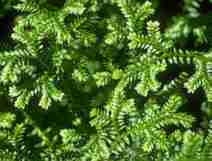
| Palaeos |  |
Lycopodiophyta |
| Plants | Selaginellales |
| Page Back | Unit Back | Up | Unit Home | Glossary |
| Page Next | Unit Next | Down | Plants | Dendrogram |

The Selaginellales or "spike mosses" are a very ancient group that includes the modern genus Selaginella with about 700 species and a worldwide distribution, and fossil forms called Selaginellites. They are more reproductively complex and more widely distributed in the tropics than Lycopodium, although they have similar dichotomous branching.
These plants first appeared and diversified during the Carboniferous period (at least the Bashkirian and possibly as early as the Visean epoch, or even the Famennian (latest Devonian)). They seem to be transitional between the primitive Lycopodiales and the rather more advanced Isoetales, and probably evolved from Protolepidodendrales some time during the middle Devonian. Like these other forms they are herbaceous, and like the Protolepidodendrales and their other descendents they produce two types of spores (are heterosporous). They share with the Isoetales a small flap-like structure called a ligule on the upper surface of their leaves.
Order Selaginellales
family Selaginellaceae (Selaginella, Selaginellites)
| Page Back | Page Up | Page Top | Page Next |